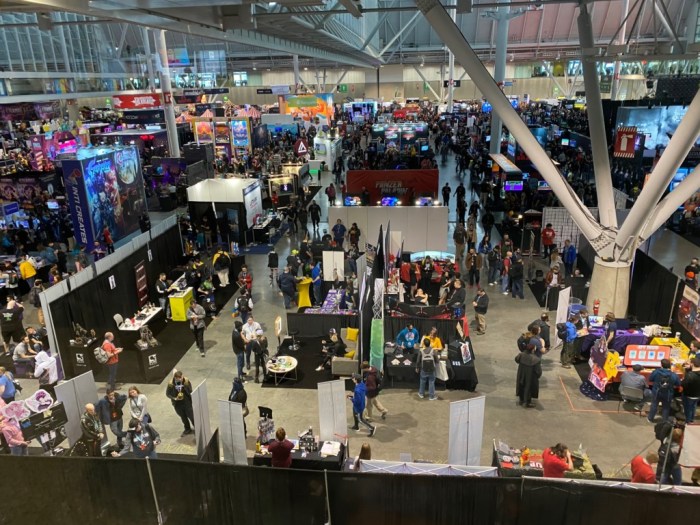
Kicking off with Role-Playing Game Conventions, get ready to dive into a world where gamers come together to celebrate their passion for gaming with unique activities and events.
From exploring popular conventions worldwide to understanding their impact on community building, this topic is sure to spark your interest!
Role-Playing Game Conventions
Role-playing game conventions play a crucial role in the gaming industry, serving as platforms where enthusiasts gather to celebrate their love for RPGs, share experiences, and engage in various activities.
Significance of Role-Playing Game Conventions
Role-playing game conventions are significant as they provide a space for players, game developers, and industry professionals to come together, showcase new games, discuss trends, and network.
Popular Role-Playing Game Conventions Worldwide
- Gen Con (USA)
- PAX Unplugged (USA)
- UK Games Expo (UK)
- Dragonmeet (UK)
- Essen Spiel (Germany)
Role-Playing Game Conventions and Community Building
Role-playing game conventions foster a sense of community among gamers by providing a space for like-minded individuals to connect, share strategies, and form lasting friendships based on their common interest in RPGs.
Unique Activities at Role-Playing Game Conventions
- Cosplay Contests: Participants showcase their creativity by dressing up as their favorite RPG characters.
- Game Demos: Attendees get the chance to playtest upcoming RPGs and provide feedback to developers.
- Panel Discussions: Experts and industry insiders share insights on game design, storytelling, and other RPG-related topics.
- Live Role-Playing Sessions: Interactive sessions where players immerse themselves in RPG scenarios, often led by experienced game masters.
Gaming Board Online Games Business
Online gaming board games have a unique business model where players can access and play these games on digital platforms. These games often offer a mix of single-player and multiplayer options, along with various features such as chat functions, leaderboards, and in-game purchases.
Revenue Generation Strategies
Online gaming board games generate revenue through various strategies such as:
- Subscription models: Players pay a recurring fee to access premium features or exclusive content.
- Microtransactions: Players can purchase in-game items, currency, or expansions to enhance their gameplay experience.
- Ad revenue: Some games incorporate ads that players can watch for in-game rewards, providing an additional revenue stream.
- Downloadable content: Offering additional content for purchase, such as new game modes, characters, or expansions.
Impact of Online Platforms
Online platforms have significantly impacted the growth of the gaming board games industry by:
- Expanding reach: Online platforms allow players from around the world to connect and play together, increasing the player base.
- Accessibility: Players can easily access games anytime, anywhere, without the need for physical game pieces or boards.
- Continuous updates: Online games can receive regular updates, new content, and patches to enhance the gaming experience and keep players engaged.
Successful Online Gaming Board Games Businesses
Some successful online gaming board games businesses include:
- Tabletopia: Offers a digital platform where players can access a library of board games to play online with friends.
- Board Game Arena: Provides a platform for players to enjoy multiplayer board games, including classics and modern titles.
- Asmodee Digital: Adapts popular board games into digital versions, offering a wide range of titles for players to enjoy online.
Online Gaming
Online gaming has come a long way since its inception, shaping the way we interact and play games in the digital world. Let’s dive into the evolution, impact, and popularity of online gaming.
Evolution of Online Gaming
Online gaming began in the early 1970s with games like MUDs (Multi-User Dungeons), which allowed multiple players to interact in a virtual world. As technology advanced, so did online gaming, with the introduction of MMORPGs (Massively Multiplayer Online Role-Playing Games) like World of Warcraft in the early 2000s. Today, online gaming encompasses a wide range of genres and platforms, from PC to consoles to mobile devices.
Online Gaming Communities
Online gaming communities play a crucial role in shaping the online gaming experience. These communities provide a space for players to connect, collaborate, and compete with each other. Whether it’s forming guilds in MMORPGs or joining Discord servers for voice chat, online gaming communities enhance social interactions and create a sense of belonging among players.
Impact on Social Interactions
Online gaming has had a significant impact on social interactions and relationships. It has blurred the lines between virtual and real-life friendships, with many players forming strong bonds with people they’ve never met in person. However, it has also raised concerns about addiction, cyberbullying, and toxic behavior. Despite these challenges, online gaming continues to be a popular form of entertainment for millions around the world.
Popular Genres in Online Gaming
Some of the most popular genres in online gaming include:
- First-person shooters (FPS): Fast-paced games that focus on gunplay and combat mechanics, like Call of Duty and Overwatch.
- MOBAs (Multiplayer Online Battle Arenas): Team-based games where players control unique characters with distinct abilities, such as League of Legends and Dota 2.
- MMORPGs: Immersive games that allow players to explore vast virtual worlds, complete quests, and interact with other players, like Final Fantasy XIV and Elder Scrolls Online.
- Battle royale: Last-player-standing games where players fight to be the sole survivor, such as Fortnite and PUBG.
These genres offer diverse gameplay experiences and cater to a wide range of preferences among online gamers.
Gaming Communities

Gaming communities play a crucial role in the gaming world, bringing together players who share common interests, creating spaces for interaction, collaboration, and competition.
Famous Gaming Communities
Here are examples of successful gaming communities:
- Reddit’s r/gaming: Known for its active discussions, sharing of gaming news, memes, and fan art.
- Discord servers: Popular for connecting gamers through voice and text channels, organizing events, and forming gaming squads.
- MMORPG guilds: Groups within massive multiplayer online role-playing games that collaborate on quests, raids, and social activities.
Influence on Game Development and Player Engagement
Gaming communities have a significant impact on game development and player engagement:
- Feedback loop: Developers often interact with gaming communities to gather feedback, suggestions, and bug reports to improve the gaming experience.
- Player retention: Engaging communities foster a sense of belonging, encouraging players to stay invested in the game and participate in events.
- User-generated content: Communities contribute to the creation of mods, custom maps, and fan fiction, extending the game’s lifespan and variety.
Organizing and Participating in Gaming Events
Gaming communities play a vital role in organizing and participating in gaming events:
- LAN parties: Communities arrange local area network parties for players to meet in person, play together, and socialize.
- E-sports tournaments: Competitive gaming communities organize and participate in e-sports events, showcasing skill and sportsmanship.
- Game nights: Regular gatherings where community members come together to play games, share strategies, and build friendships.
Role-Playing Games

Role-playing games, commonly known as RPGs, have a universal appeal to gamers of all ages due to their immersive storytelling, character development, and strategic gameplay. Whether played on tabletops, acted out in live-action settings, or experienced in digital form, RPGs offer a unique and engaging experience that allows players to escape reality and become part of a fantastical world.
Types of Role-Playing Games
- Tabletop RPGs: Tabletop RPGs involve players gathering around a table, using rulebooks, character sheets, and dice to navigate through a story led by a game master. Popular tabletop RPGs include Dungeons & Dragons and Pathfinder.
- Live-Action RPGs: Live-action RPGs take the gameplay off the table and into the real world, where players physically act out their characters’ actions and decisions. This type of RPG often involves elaborate costumes, props, and immersive settings.
- Video Game RPGs: Video game RPGs combine elements of traditional RPG gameplay with interactive visuals and digital storytelling. Players control characters in a virtual world, making choices that impact the game’s narrative and outcomes. Examples include Final Fantasy, The Witcher, and Skyrim.
Storytelling in Role-Playing Games
Role-playing games heavily rely on storytelling to create a rich and engaging gaming experience. The narrative drives the gameplay, immersing players in a world filled with quests, mysteries, and character interactions. The role of storytelling in RPGs is to not only provide context for the player’s actions but also to evoke emotions, build connections with characters, and create memorable moments that shape the overall experience.
Tips for Newcomers
1. Start with a beginner-friendly RPG system to ease into the gameplay mechanics and storytelling aspects.
2. Familiarize yourself with the setting and rules of the game before diving into your first session.
3. Don’t be afraid to role-play your character and get into their mindset to fully immerse yourself in the game world.
4. Communicate openly with your fellow players and game master to ensure a collaborative and enjoyable gaming experience.
5. Embrace creativity and think outside the box when solving problems or interacting with the game world.
Car Racing Games
Car racing games have always been a popular genre among gamers, offering thrilling experiences and adrenaline-fueled competitions on virtual tracks.
Simulation vs. Arcade-style Racing Games
When it comes to car racing games, there are two main categories: simulation and arcade-style. Simulation racing games aim for realism, focusing on accurate physics, vehicle handling, and detailed tracks. On the other hand, arcade-style racing games prioritize fun and accessibility, with simpler controls, exaggerated physics, and a more casual approach to gameplay.
Influence on the Racing Genre
Car racing games have had a significant influence on the racing genre in the gaming industry. They have pushed the boundaries of graphics and gameplay mechanics, leading to innovations in racing simulations and arcade-style experiences. These games have also inspired developers to create more immersive and competitive multiplayer modes, adding to the overall appeal of the genre.
Must-Play Car Racing Games
- Gran Turismo Series
- Need for Speed Series
- Forza Motorsport Series
- Project Cars
- Assetto Corsa
- Mario Kart Series
Video Game Reviews
Video game reviews play a crucial role in helping gamers make informed purchasing decisions before investing their time and money into a new game. These reviews provide valuable insights, opinions, and critiques that can influence whether a player decides to buy a game or not.
Criteria Used by Reviewers
Reviewers evaluate and rate video games based on various criteria to provide an overall assessment of the game’s quality. Some common factors that reviewers consider include:
- Gameplay mechanics and controls
- Graphics and visual presentation
- Storyline and narrative
- Sound design and music
- Replay value and longevity
- Bugs, glitches, and technical issues
Impact of Positive vs. Negative Reviews
Positive reviews can significantly boost a game’s success by generating hype, increasing sales, and attracting a larger player base. On the other hand, negative reviews can deter potential buyers, damage the game’s reputation, and lead to poor sales. Developers often rely on positive reviews to drive the success of their games in a competitive market.
Tips for Writing a Comprehensive Review
- Play the game thoroughly before writing the review to have a complete understanding of its strengths and weaknesses.
- Provide a detailed analysis of gameplay, graphics, story, sound, and overall experience without bias.
- Back up your opinions with specific examples and avoid vague statements.
- Consider the target audience and tailor your review to their preferences and expectations.
- Be honest and transparent in your assessment, highlighting both positive and negative aspects of the game.
Gaming Cruises
Gaming cruises offer a unique experience that combines the thrill of gaming with the excitement of travel. Imagine playing your favorite video games or tabletop RPGs while cruising on the open sea or exploring exotic destinations.
These cruises cater to gamers of all kinds, providing dedicated gaming spaces, organized tournaments, and opportunities to connect with like-minded individuals. It’s a chance to immerse yourself in your passion for gaming while enjoying a luxurious vacation.
Popular Gaming Cruises and Unique Features
- The JoCo Cruise: Known for its music and comedy events, the JoCo Cruise also offers a variety of gaming activities such as board games, video game tournaments, and role-playing sessions.
- Gamer Journeys: This cruise specializes in tabletop gaming, with onboard experts leading game sessions, workshops, and demos. It’s a great opportunity to discover new games and techniques.
- Royal Caribbean’s Spectrum of the Seas: This cruise ship features a cutting-edge gaming zone with VR experiences, escape rooms, and interactive game shows, providing a high-tech gaming environment at sea.
Benefits of Gaming Cruises
- Unique Gaming Experience: Gaming cruises offer a one-of-a-kind setting for playing games and socializing with fellow gamers.
- Travel and Gaming Combination: By combining travel with gaming, participants can explore new destinations while enjoying their favorite games.
- Community Building: Gaming cruises foster a sense of community among participants, creating lasting connections and friendships.
Future Trends and Growth of Gaming Cruises
As gaming continues to grow in popularity and accessibility, the demand for gaming cruises is expected to rise. Cruise lines are likely to enhance their onboard gaming offerings and partner with gaming companies to create unique experiences for passengers. Additionally, themed gaming cruises focused on specific games or genres may become more prevalent, catering to niche gaming communities.
Console Games
When it comes to gaming, one of the biggest decisions players face is choosing between console gaming and PC gaming. Each has its own advantages and disadvantages, catering to different preferences and gaming styles.
Console gaming offers the convenience of plug-and-play, making it easy for users to start playing without worrying about hardware specifications or compatibility. On the other hand, PC gaming provides more customization options, allowing players to upgrade their hardware for better performance and graphics.
Evolution of Console Games
Console games have come a long way since the early days of Pong and Atari. From simple 2D graphics to immersive 3D worlds, the evolution of console games has been remarkable. With each new generation of consoles, we see advancements in graphics, gameplay mechanics, and online features.
Impact of Exclusive Titles
- Exclusive titles play a significant role in driving console sales and establishing market share. Games like “Halo” for Xbox and “Uncharted” for PlayStation create a loyal fan base and attract new players to a particular console.
- These exclusive titles showcase the unique strengths of each console, whether it’s powerful graphics, innovative gameplay, or compelling storytelling.
- Console manufacturers often invest heavily in securing exclusive titles to differentiate their products from competitors and create a strong brand identity.
Choosing the Right Console
- Consider your gaming preferences when choosing a console. Do you prefer single-player experiences, competitive multiplayer, or indie games?
- Research the exclusive titles available on each console to see which lineup appeals to you the most.
- Think about your budget and whether you’re willing to invest in additional accessories like controllers, headsets, or subscription services.
Closing Notes
As we wrap up our discussion on Role-Playing Game Conventions, it’s clear that these events play a crucial role in connecting gamers and enhancing the overall gaming experience. So next time you attend a convention, remember to immerse yourself in the fun and excitement!
Q&A
Are role-playing game conventions only for hardcore gamers?
Not at all! Role-playing game conventions welcome gamers of all levels, from beginners to seasoned players, creating a diverse and inclusive community.
What kind of activities can one expect at role-playing game conventions?
Activities range from live-action role-playing games to tabletop gaming tournaments, cosplay contests, and interactive storytelling sessions.
How do role-playing game conventions contribute to community building?
By bringing gamers together in one space, conventions foster friendships, collaborations, and shared experiences that strengthen the gaming community.






